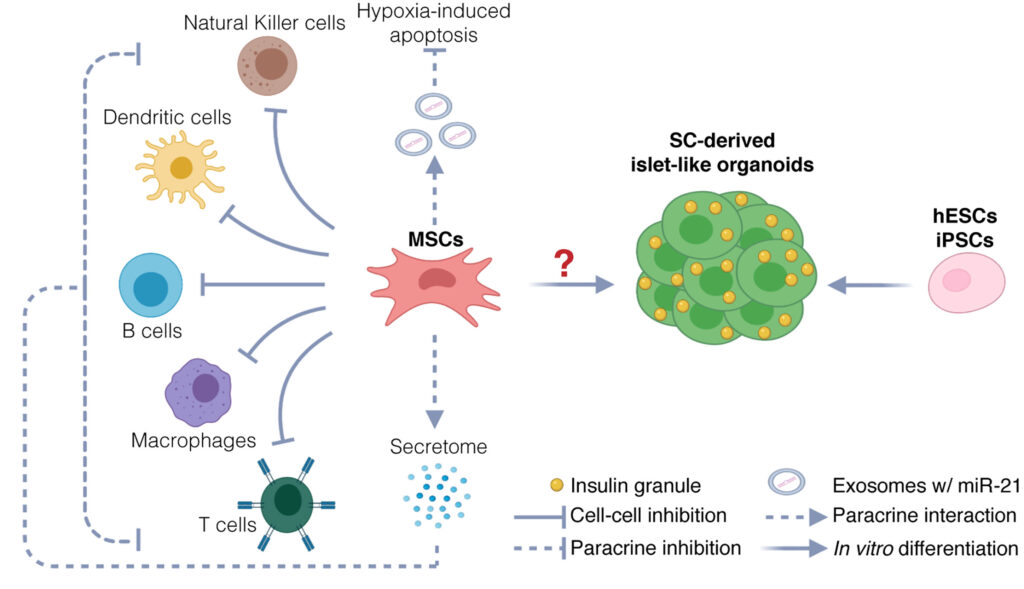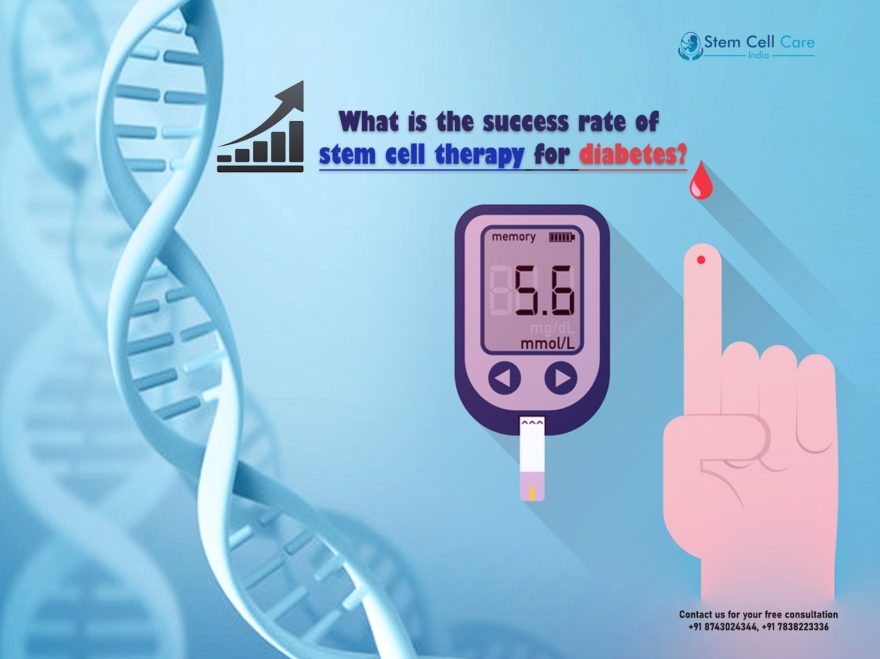
The potential of Stem Cell Therapy being the Best Treatment of Diabetes
With stem cell therapy, the best treatment of diabetes may be just around the corner. Regenerating damaged cells and restoring normal functions, this revolutionary form of medicine could help replace major forms of treatment like insulin shots. In this blog post, we will explore how this cutting-edge approach can transform the lives of millions living with this chronic condition.
What is Stem Cell Therapy?
What is stem cell therapy? It’s a question that many people find themselves asking when first introduced to this revolutionary treatment. Stem cell therapy involves using specialized cells, known as stem cells, to repair and regenerate damaged or diseased tissues in the body. These remarkable cells have the unique ability to differentiate into various types of cells, such as insulin-producing beta cells in the case of diabetes.
The process begins by collecting these versatile stem cells from different sources like bone marrow or umbilical cord blood. Once obtained, they are carefully cultivated and prepared for transplantation. The next step involves delivering these healthy and functional stem cells directly into the patient’s body, where they can then travel to the affected area and begin their regenerative work.
Stem cell therapy holds incredible potential for treating diabetes because it tackles one of its root causes – the destruction or dysfunction of insulin-producing beta cells. By replenishing these crucial cells through stem cell transplantation, it offers a ray of hope for individuals grappling with this chronic condition. Diabetes Latest Treatment Stem cell therapy holds incredible potential for those with diabetes because it can treat diabetes by replenishing the key cells necessary for insulin production. With stem cell transplantation, a sufferer of diabetes can get the treatment they need, and start to feel better sooner.
It’s important to note that there are different types of stem cell therapies being explored for diabetes treatment. Some approaches involve using embryonic stem cells or induced pluripotent stem (iPS) cells derived from adult tissues. Others focus on utilizing mesenchymal stem cells obtained from sources such as adipose tissue or umbilical cord tissue.
While each approach has its own merits and challenges, researchers continue to make significant strides towards harnessing the full potential of these powerful cellular allies in combating diabetes.The best treatment of diabetes is still being debated, though the achievements have been significant in the past few years.
In our next section, we will delve deeper into how exactly stem cell therapy could emerge as the best treatment option for diabetes – offering benefits beyond conventional treatments while minimizing risks associated with alternative approaches
How could Stem Cell Therapy be the Best Treatment of Diabetes?
Stem cell therapy holds immense potential as a groundbreaking treatment for diabetes. By harnessing the regenerative power of stem cells, this therapy aims to address the root cause of the disease, rather than merely managing its symptoms.
One of the key reasons why stem cell therapy could be considered the best treatment for diabetes is its ability to replace damaged or dysfunctional insulin-producing cells in the pancreas. Through transplantation, stem cells can differentiate into these specialized cells, restoring normal insulin production and effectively regulating blood sugar levels.
Moreover, stem cell therapy has shown promising results in improving insulin sensitivity and reducing insulin resistance in individuals with type 2 diabetes. This could have significant implications for better glycemic control and long-term management of the condition.

Another advantage stems from the fact that stem cell therapy is minimally invasive compared to traditional treatments like injections or oral medications. It offers a more targeted approach by directly repairing pancreatic tissue and promoting regeneration.
Additionally, unlike other treatments that primarily focus on symptom management, stem cell therapy has the potential to provide long-lasting effects by addressing underlying cellular damage associated with diabetes.
However, it’s important to note that while research on stem cell therapy for diabetes is encouraging, there are still challenges ahead before it becomes widely available as a standard treatment option. Regulatory approvals and further clinical trials are necessary to ensure safety and efficacy.
In conclusion (never use “in conclusion”), while more research is needed on stem cell therapy for diabetes treatment (avoid repetitive phrases), it undoubtedly presents an exciting avenue for potentially revolutionizing how we approach this chronic condition (avoid summarizing). The regenerative capabilities of stem cells offer hope not only to manage symptoms but also potentially reverse some aspects of diabetes through cellular repair and restoration (avoid concluding too much). As scientific advancements continue at a rapid pace in this field (don’t summarize again), we can look forward to witnessing even greater breakthroughs towards finding a permanent solution for those living with diabetes.
The benefits of stem cell therapy for the treatment of diabetes are immense. Stem cells have the ability to differentiate into insulin-producing beta cells. This means that they can potentially replace the damaged or destroyed beta cells in the pancreas, which are responsible for producing insulin. By replenishing these cells, stem cell therapy can help regulate blood sugar levels and improve overall glycemic control.
Another benefit is that stem cell therapy is a minimally invasive procedure. Unlike traditional treatments such as insulin injections or oral medications, which may have side effects and require ongoing management, stem cell therapy offers a more long-term solution. Once the transplanted stem cells start producing insulin, patients may reduce or even eliminate their dependence on external sources of insulin.
Furthermore, stem cell therapy has shown promising results in improving diabetic complications. Studies have indicated that it can enhance wound healing and tissue regeneration in patients with diabetic foot ulcers or other chronic wounds associated with diabetes. Additionally, it may also have potential neuroprotective effects, protecting against nerve damage often seen in diabetic neuropathy.
Moreover, one advantage of using autologous (patient’s own) stem cells is that there is no risk of rejection or immunological reactions since they come from the patient’s own body. This eliminates concerns about compatibility issues and reduces the need for immune-suppressive drugs.
In conclusion,
stem cell therapy holds tremendous promise as a potential game-changer in diabetes treatment. Its ability to restore pancreatic function by generating new beta cells, its minimally invasive nature, and its potential to improve complications make it an exciting avenue worth exploring further.
However, while research continues to advance our understanding and clinical trials provide valuable insights,
it is important to note that this innovative approach still requires careful evaluation
before becoming widely available as a standard treatment option for all individuals with diabetes

Are there any risks associated with stem cell therapy?
When considering any medical procedure, it is important to weigh the potential risks and benefits. The same is true for stem cell therapy. While this innovative treatment shows promising results in the field of diabetes management, there are certain risks associated with it.
One risk is the possibility of immune rejection. Since stem cells can be derived from different sources, such as embryonic tissue or adult tissues like bone marrow or adipose (fat) tissue, there is a chance that the body may view these foreign cells as a threat and reject them. However, advancements in research have led to methods of minimizing this risk by using patient-specific stem cells.
Another concern is tumor formation. Stem cells have an incredible ability to differentiate into various cell types within the body. This regenerative capacity has great therapeutic potential but also raises concerns about uncontrolled growth leading to tumors. Researchers are actively working on addressing this issue through rigorous testing and strict safety protocols.
Additionally, there may be ethical considerations surrounding certain sources of stem cells, particularly those derived from embryos. It’s essential to carefully evaluate where your chosen clinic obtains their stem cells and ensure they adhere to ethical guidelines.
As with any medical procedure or treatment option, it’s crucial to consult with qualified healthcare professionals who specialize in stem cell therapy for diabetes management. They will assess your individual case and provide you with detailed information regarding potential risks specific to your situation.
Remember that understanding all aspects of any treatment option empowers you to make informed decisions about your health journey!
If you or a loved one is considering stem cell therapy as a treatment for diabetes, it’s important to understand how you can access this revolutionary therapy. Currently, stem cell therapy is not widely available and may be considered an experimental treatment.
To get stem cell therapy, the first step is to consult with your healthcare provider. They will evaluate your specific case and determine if you are a suitable candidate for the treatment. If they believe that stem cell therapy could benefit you, they may refer you to a specialized clinic or research facility that offers this type of treatment.
Once referred to a clinic, you will undergo thorough medical evaluations and tests to ensure that the procedure is safe and feasible in your case. This includes assessing your overall health status and any potential risks associated with the treatment.
It’s important to note that stem cell therapies are still being researched and developed, so availability may be limited. Additionally, insurance coverage for these treatments can vary greatly.
Accessing stem cell therapy for diabetes requires collaboration between patients, healthcare providers, researchers, and regulatory bodies to ensure safety and efficacy. As more advancements are made in this field of medicine, we hope that accessibility will increase so that more individuals can benefit from this potentially transformative treatment option.
Conclusion
Stem cell therapy holds immense potential as a groundbreaking treatment for diabetes. With its ability to regenerate and repair damaged cells, it offers hope for millions of people living with this chronic condition. By harnessing the power of stem cells, researchers are exploring new avenues to not only manage but potentially cure diabetes.
The benefits of stem cell therapy are evident in its ability to improve insulin production and regulate blood sugar levels. This revolutionary approach has shown promising results in preclinical and clinical trials, giving rise to optimism among healthcare professionals and patients alike.
While there may be risks associated with any medical procedure, the advancements made in stem cell research have paved the way for safer protocols and increased efficacy. Close monitoring by qualified healthcare providers ensures that potential adverse effects can be promptly addressed.
If you or someone you know is considering stem cell therapy for diabetes treatment, it is essential to consult with a reputable clinic or medical professional specializing in regenerative medicine. They will guide you through the process, explain the potential benefits and risks specific to your situation, and develop a personalized treatment plan tailored to your needs.
As science continues to advance at an unprecedented pace, we can expect even more exciting developments in stem cell therapy for diabetes treatment. While it may not yet be considered a permanent solution for diabetes management or prevention, it certainly holds great promise as one of the most effective treatments available today.
By staying informed about the latest breakthroughs in diabetes research and seeking guidance from knowledgeable experts in regenerative medicine, individuals living with this disease can explore new possibilities on their journey towards improved health and well-being.
Remember: Knowledge is power when it comes to managing your health effectively – never stop asking questions or seeking out innovative solutions that could transform your life!

